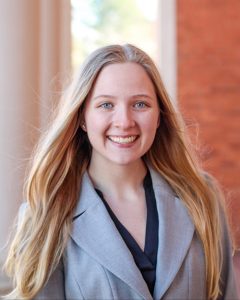Caroline Lubbe and Aniela Nozka, both Ph.D. candidates in chemical engineering, were recently selected to receive the National Science Foundation’s Graduate Research Fellowship Program (NSF GFRP).
“This highly competitive fellowship aims to ensure the quality, vitality, and strength of the scientific and engineering workforce of the United States,” said Carlos Rinaldi-Ramos, Ph.D., chair of the Department of Chemical Engineering.
Aniela and Caroline benefited from the efforts of Whitney Stoppel, Ph.D., assistant professor, and V.J. Tocco, Ph.D., instructional assistant professor, in preparing many of our undergraduate and graduate students to compete for this prestigious award. The five-year Fellowship provides three years of financial support, including an annual stipend of $37,000.
Caroline Lubbe

Lubbe, a Ph.D. candidate, was named an NSF GRFP awardee in STEM Education and Learning Research for her proposal that will be conducted in the UF Department of Engineering Education (EEd). This fellowship recognizes her academic excellence and potential to make a meaningful impact on research and society.
Under the guidance of Sindia M. Rivera-Jiménez, Ph.D., an assistant professor in EEd, Lubbe will lead a longitudinal mixed-methods study using an intersectionality lens to explore the post-transfer experiences of transfer students. As the first UF chemical engineering Ph.D. student focused on engineering education research, she applies policy-driven research methodologies to support transfer students in research-intensive institutions.
Lubbe discovered her passion for engineering education through the Research Experience for Undergraduates (REU) program, which was partially supported by the NSF REU Site and NSF RIEF. Since then, she has mentored four undergraduates, published and presented two conference papers, won a best poster award, completed an NSF policy internship, and is working on two peer-reviewed publications for this summer. She successfully defended her Ph.D. proposal on April 24.
Aniela Nozka
Nozka, a Ph.D. candidate, was named an NSF GFRP awardee in chemical engineering. Her research is focused on nanomaterials for biomedical applications under the advisement of Rinaldi-Ramos.

“I work on formulating nanocarriers for magnetic particle imaging-guided cancer hyperthermia treatment. In this study, I hope to improve magnetic fluid hyperthermia treatment as a cancer therapy by developing thermal dosimetry methods and quantifying relationships between nanoparticle distribution within the tumor and treatment efficacy,” Nozka explained.
While pursuing her undergraduate degree at Clemson University, Nozka’s research focused on synthesizing magnetic nanoparticles that would also be used for magnetic hyperthermia applications.
“This propelled me into the field, so I joined the Rinaldi-Ramos lab to continue working on these nanomaterials. I decided I wanted to focus more on the biological applications of these materials for my Ph.D., so now my work is on that,” she said.
“My goal for this fellowship is to, in my research, gain skills in nanomaterial formulation and characterization as while as techniques in cell culture and in vivo experiments. I also want to network with people not only in the field of magnetic nanoparticles, but also in nanomedicine, and understand research and challenges in this field,” Nozka added.
In 2022, Nozka participated in the REU program in the chemical engineering department, doing research in Rinaldi-Ramos’ lab under the guidance of Ph.D. candidate Ambar Velazquez-Albino. She and Velazquez-Albino co-authored and published a manuscript about their research. In 2024, she presented her research at three conferences: NanoFlorida, in Tallahassee; at NanoDDS in Orlando; and Frontiers in Magnetic Carriers, in Barcelona, where she earned fourth place for her poster presentation. She plans to defend her Ph.D. proposal on May 12.
By Sindia Rivera-Jimenez and Ada Lang
